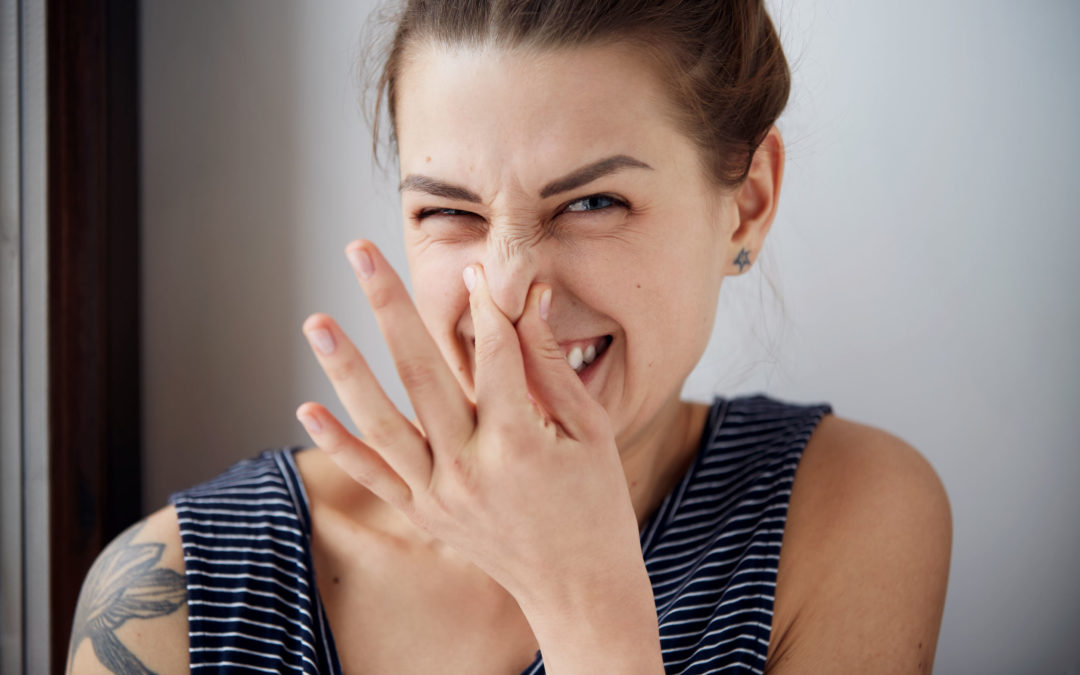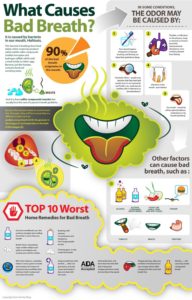Do you wake up to bad breath?
Or worse, do you think bad breath is keeping friends away?
What is bad breath?
Bad breath, “halitosis” or “oral malodour” has many different origins and as a result, treatment heavily relies on diagnosing the cause of the malodour.
Halitosis can cause a person to lose self-esteem and consequently suffer socially.
So what causes this problem and how can we treat it?
What causes bad breath?
The main culprit: Oral Hygiene
Food debris can remain between the teeth and start to rot – causing the oral malodour.
On a smaller level, food that is remaining in the mouth can fuel dental bacteria to form plaque – a matrix of bacteria and its bio-waste that can cause periodontal (gum) disease and decay. The bacteria most commonly associated with halitosis are gram negative bacteria, which are often associated with periodontal (gum) disease. Periodontal disease causes the pocket between the gum and the tooth to widen, thus allowing more gram negative bacteria to flourish. The complex interactions between these bacteria cause the malodour of the mouth.
In addition the pockets that are formed with severe periodontal disease may be so deep, that simple brushing and flossing may not be enough to clean out these pockets.
The tongue contains little filaments that can retain food. Similarly to periodontal disease, if this food is not removed, bacteria can colonise to release sulphur-gases and therefore cause halitosis. By brushing your tongue gently after brushing your teeth, this can easily remove the debris and halitosis-causing bacteria from your tongue.
Bad breath and your health:
Systemic origins of halitosis are a less likely cause but would require management by a physician to treat.
This can include diabetes whereby ketoacidosis (unstable diabetes) features a change in the breath so that it smells like nail polish.
People suffering from gastro-oesophageal reflux, renal failure and leukaemia can also experience halitosis due to the changes in the body and mouth.
Respiratory tract infections such as sinusitis and tonsillitis can produce secretions that cause bad breath.
In addition, it may also cause the sufferer to breathe through their mouth. The side effect of mouth breathing is a dry mouth. The mouth is often lubricated with saliva that has physical and chemical properties that remove bacteria from the mouth that can cause malodour.
You smell like what you eat
What you put into your body can also affect the way your mouth smells. Obvious offenders would include consumption of garlic, onion and spices.
Tobacco and alcohol can also cause malodour of the mouth that can last several hours.
Some prescribed drugs that are used to treat systemic issues can also cause dry mouth, which in turn can result to halitosis.
How to treat bad breath
In most cases, a visit to our oral health department for thorough gum treatment combined with good oral hygiene at home including brushing and flossing can make all the difference.
In more persistent cases specific mouth rinses are extremely effective. These have been developed and researched extensively; the most successful one is called ‘Cloysis’.
At Hartwell Dentistry many patients have found this a wonderful product.
In a minority of cases, if halitosis still persists after the above protocols, a referral to an oral medicine specialist is advised.


